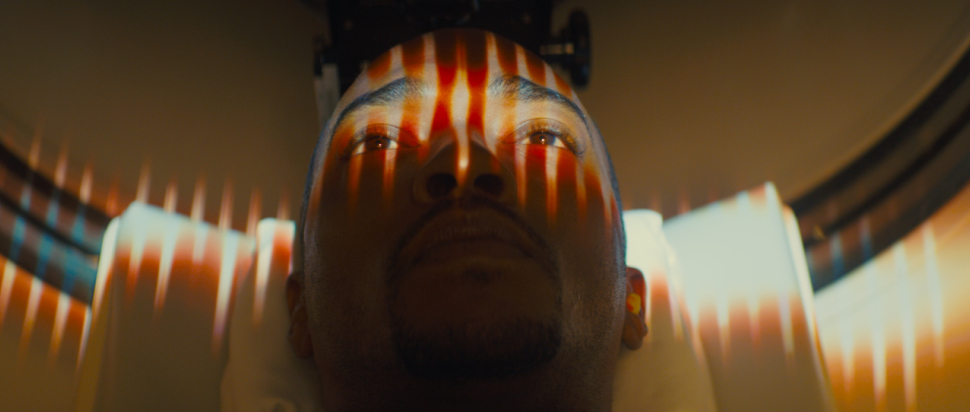Justin Benson and Aaron Moorhead on Synchronic
Directing duo Justin Benson and Aaron Moorhead return with time-travelling movie Synchronic. The pair discuss making ambitious sci-fi on a shoestring, their hatred of exposition and nostalgia as a toxic drug
Justin Benson and Aaron Moorhead make genre films as ambitious as those of, say, Christopher Nolan or Denis Villeneuve, but on budgets that wouldn’t even cover the catering on the grand productions by those storied directors. Smart writing, compelling performances and vivid camerawork cover over any limitations in financing.
Their debut, Resolution, was Cabin in the Woods on a shoestring. Spring was a body-horror romance that blended Richard Linklater's Before Sunrise with HP Lovecraft. Third feature, The Endless, their finest film so far, was a delicious puzzle movie following two brothers (played by Benson and Moorhead) whose lives are entangled with a UFO death cult; the film soon amassed its own cult following.
It’s a strikingly original body of work. I wonder if the puniness of their production coffers contributes to the immensity of their invention. “I won't say our relative lack of resources is what makes us good filmmakers,” says Moorhead when I meet him and Benson, sans masks, back in March at the 2020 Glasgow Film Festival. “I will say, though, I do think our stories have definitely improved because of the limitations. When we try to create something that is a hand-over-fist DIY movie, we make sure that nothing goes into the script that we don't already know how to do. If we know how to do it, we know it'll at least execute close to correct.”
Another pleasing aspect to Moorhead and Benson’s films is they manage to deliver their brain-boggling premises without drowning the audience in expositional dialogue (the aforementioned Christoper Nolan should take note). These are high-concept films with plenty of flavour, where character, tone and atmosphere are just as important as the brainy sci-fi conceit.
“When I see a film where all the dialogue is plot and exposition, it drives me crazy,” says Benson.
“It hurts me!” agrees Moorhead. “It's a physically painful thing.”
“They're just saying plot, please say something else, like talk about anything else right now.”
Benson, though, reminds us that it isn’t necessarily the screenwriter who’s to blame. “If Pulp Fiction didn't exist, and you sent that script to Hollywood producers to get it made, they would absolutely be like, ‘Hey, you've got to cut some of this back.’ But anyone who sees the finished film, I don't think anyone would cut a line of that dialogue. Why? Because if it's really good, no one's gonna say to ‘cut it’.”
“What if someone did a cut of Pulp Fiction where you cut out anything that wasn't plot-driven?” muses Moorhead.
“Oh man,” laughs Benson. “It would be a five minute short about a briefcase.”
New film Synchronic is no less inventive and idiosyncratic than those earlier films, although superficially it looks more expensive thanks to a couple of A-listers in the lead roles. Anthony Mackie and Jamie Dornan play overworked New Orleans paramedics who are having a hell of a busy week thanks to the new designer drug that gives the film its title. Users of synchronic are being found dead all over the Big Easy and the boys soon discover this drug doesn’t just take you on a mental trip, but on a physical one too, the destination being the past. Yes, that’s right: synchronic is a time-travel pill.
Filmmakers usually struggle to trace the exact eureka moments of their movies, but when I ask about Synchronic’s, I get a date and location. “We were in a bagel shop in Toronto waiting to do a screening at Turn After Dark film festival in 2012 and Back to the Future was on TV,” says Benson without missing a beat. “We were just sitting and watching and being like, ‘Hey, this would be way different if Marty McFly wasn't a white heterosexual male.’ So much in the story changes and his biggest problem in the 1950s isn’t his mom trying to hook up with him.”
“By the way, that's not a dig at Back to the Future,” Moorhead interrupts. “I mean, every scene in that movie is the best scene. It's amazing. We’d hate for it to get back to Robert Zemeckis that we weren’t fans.” FYI, Bob, if you’re reading.
Mackie’s character gets hold of some synchronic and discovers, as a black man, just what Benson and Moorhead are alluding to: the increased racism and violence a person of colour would experience if they were able to zap themselves to the past. In this respect, the film acts as a pleasing rebuttal to the increased yearning for the past that drives so much right-wing rhetoric in the US as well as here in the UK.
“Nostalgia is like heroin for those people,” says Moorhead. “But they somehow forget the traumas of the past. They only remember the wonderful parts. So instead of a time-travel movie dealing with something like 'the grandfather paradox', we instead dealt with nostalgia as a toxic drug, where you go back and everything sucks. The coolest thing about [the past] was maybe some retro fashion, which still comes around every 30 years anyways.”
“The music?” asks Benson.
“OK,” Moorhead concedes, “the music was pretty sweet.”
Synchronic is available on digital download on 29 Jan via Signature Entertainment
